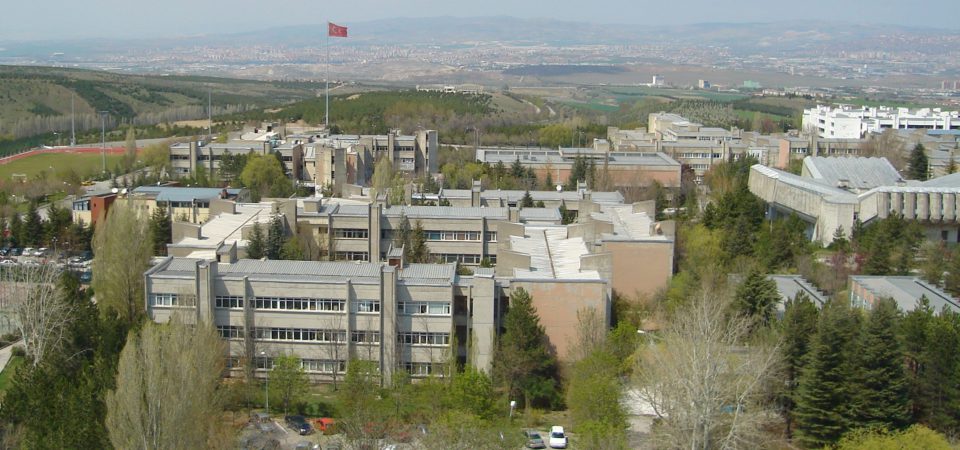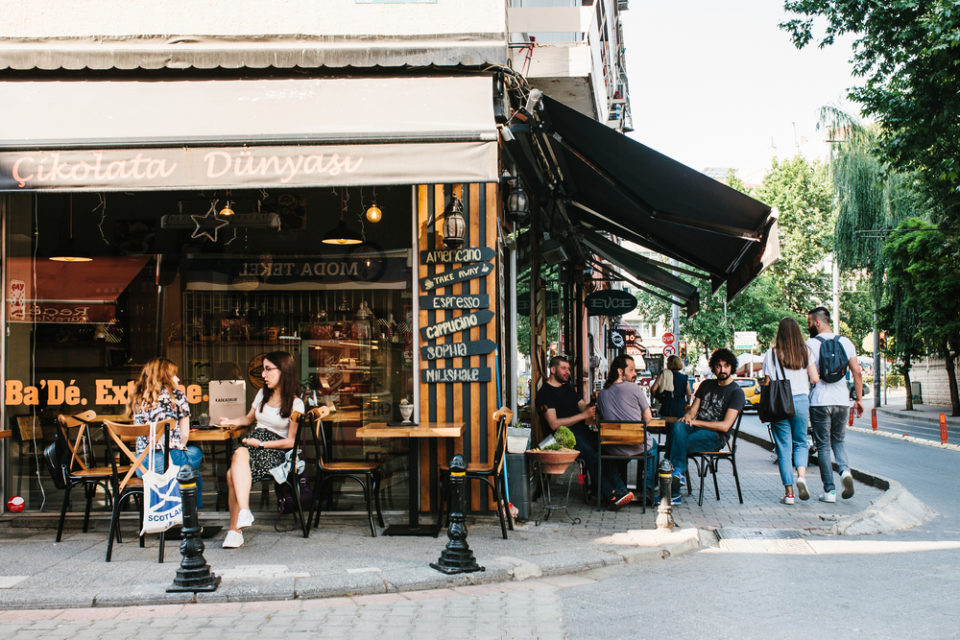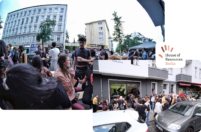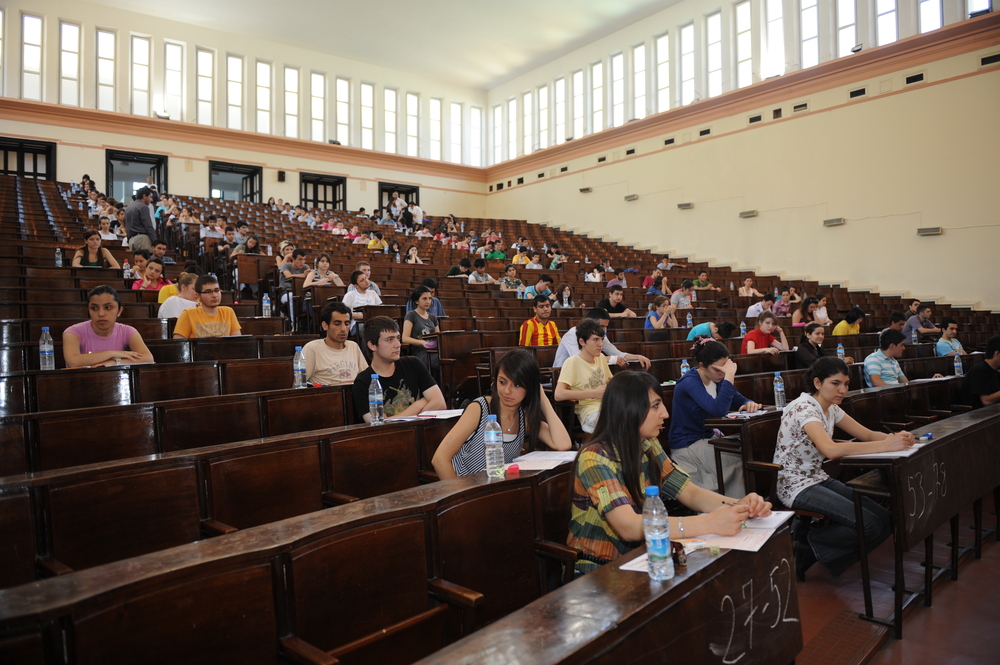Erasmus is a program by the European Union which Iceland, Norway, Switzerland and Liechtenstein can also take part in, aside from the member states. There is probably hardly anything in the crisis-ridden and often discordant EU that is so extraordinarily successful as this program. The number of participants is constantly on the rise. In 2015, 81,000 students from Germany participated in an Erasmus-funded exchange, and in the whole of Europe the numbers reached 678,000.

Turkey was a favourite among exchange countries for a long time: According to the German Academic Exchange Service (DAAD), in 2014 it was the sixth most popular destination. Online reviews of student experiences are extremely enthusiastic. A student from Uni Bremen summarizes his Erasmus stay at Marmara University Istanbul during winter semester 2012/2013 with the statement: “Istanbul is definitely the perfect choice.”
1240 Erasmus students from Germany went to Turkey; the year before there were still twice as many.
Recently though, the numbers of exchange students have plummeted. In summer of 2017, the DAAD announced that they had even halved. 1,240 Erasmus students from Germany went to Turkey; the year before there were still 2,250. Especially in winter semester 2016/2017, the appeal of studying in Turkey dropped. The causes of this could be seen as stemming from “wide-ranging societal circumstances”: the various terrorist attacks, the attempted coup in July 2016, and everything that happened after it.
First Erasmus, then a Travel Ban
From August 2014 until June 2015, Berliner Sarah. L. completed an Erasmus semester at Hacettepe University in Ankara. In the next five months she did an internship in Istanbul at the NGO Halkevleri. Afterwards, she wanted to take a few holiday months in Turkey before returning to Germany.
It was the time after Gezi. The time when the AKP lost the absolute majority in the parliamentary elections (in June 2015) for the first time ever since it had been governing the nation. They called for new elections and the conflict with the PKK ensued. During this time, multiple terrorist attacks also took place. Sarah L. witnessed two of them herself.
Sarah was at the peace rally in Ankara where more than 100 people lost their lives to an IS suicide bomber.

In early June, right before the elections, as a part of her Erasmus internship, she stood as an observer at an election rally of the leftist, pro-Kurdish party HDP in Diyarbakır. An explosion killed five people there and injured more than a hundred others. Four months later, Sarah was at the peace rally in Ankara where more than 100 people lost their lives to an IS suicide bomber. Sarah left the country shortly after.
These events continued to haunt Sarah. Three months after the failed coup attempt in July 2016, Sarah wanted to travel back to Turkey to attend a memorial service for the victims of the terrorist attack in Ankara. She was detained at the airport for 24 hours. The German embassy was not informed, nor was she allowed to make a phone call. She was placed on a return flight back to Germany. A travel ban was imposed on her because she was seen as a “threat to public safety”.
With the help of a lawyer, Sarah L. was able to appeal against the travel ban at a Turkish court. The process is still pending until today. Fearing arrest, she wouldn’t currently travel to Turkey anyway, says Sarah.
An Exodus of Intellectuals
The DAAD is very concerned about the situation in Turkey and at its universities. On July 20th, 2016, Margaret Wintermantel, the president of the Academic Exchange Service, published a statement: “We are observing the current situation in Turkey with great concern”, it said. “The colossal and substantial damage inflicted upon the autonomy of Turkish universities is not acceptable.” The reason for this statement was that the Turkish Council of Higher Education had restricted academics from undertaking any research trips abroad.
After the attempted coup the entire Turkish public service sector was “cleansed”. More than 140,000 public servants were fired or suspended, including numerous professors and lecturers at national universities. This caused research and teaching to be de facto impossible at many institutions.
In addition to the question whether an Erasmus exchange can still be considered safe on the Bosporus, the question also arises whether the quality and autonomy of teaching can be guaranteed. The answer is currently: no.
 Are the carefree student days over?
Are the carefree student days over?
Does Erasmus still have a future?
Those following the current debates in Germany and in the EU should also be raising another question: Does Turkey still have a future within the Erasmus program? The program is also dependent on the status of the country as a candidate for EU accession. The so-called pre-accession aid, the money that Turkey receives as a candidate, flows into the educational exchange. If the negotiation talks on EU accession are stalled or even stopped, as it is being discussed all across the German political parties, this could mean an end to Erasmus.
“Don’t leave us alone with Erdoğan”, the liberal-leaning journalists and opposition members in Turkey say on the topic of the EU accession negotiations.
Sarah would find this heart-breaking. Answering the question, whether she believes that Turkey still has potential as a destination for Erasmus students, she is torn. “I’m conflicted about that”. For the following reason: “If everyone stays away from Turkey, the government there can get away with doing what it wants even more.”
This is also the direction the commentaries of liberal-leaning journalists and opposition members in Turkey take on the topic of the EU accessions negotiations. “Don’t leave us alone with Erdoğan”, is the general sentiment. A plea that could perhaps – despite the many existing dangers and restrictions – be taken to heart.
Credits
Translation: Karin Louise Espejo Hermes
Images: Shutterstock






